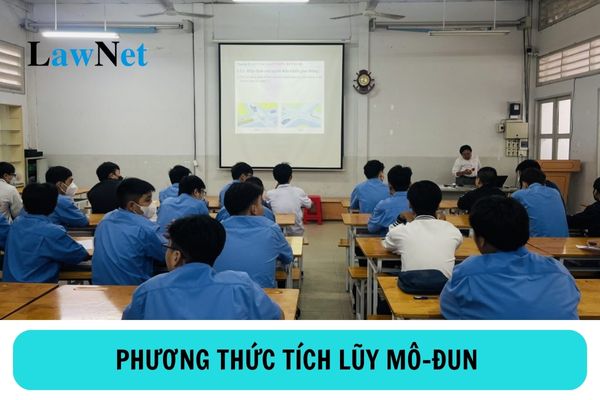What is modular accumulation training in college-level education training in Vietnam?
What is modular accumulation training in college-level education training in Vietnam?
Pursuant to Clause 2 Article 2 of Circular 04/2022/TT-BLDTBXH:
Terminology Explanation
In this Circular, the following terms are understood as follows:
- Annual-based training is a training organization method by academic year with relatively fixed classes throughout the entire course, allowing students (hereinafter referred to as learners) in the same class to follow a joint, unified training plan and timetable.
- Training in the form of modular or credit accumulation is a training method based on individual learning content designed in modules or subjects. Learners can actively select modules or subjects as per the school regulations to accumulate until they complete the required module or credit volume stipulated in the program.
- Online training is a teaching form that allows part or all of the content of courses or modules in the intermediate or college-level training program to be conducted over the Internet, replacing direct teaching at vocational education institutions.
Thus, the modular or credit accumulation-based training method in college-level education is training based on individual learning contents designed in modules or subjects. Learners can actively select modules or subjects per the school regulations to accumulate until they complete the required module or credit volume stipulated in the program.

What is modular accumulation training in college-level education training in Vietnam?
How long is the training time for college-level education under the modular accumulation method in Vietnam?
Pursuant to Point d Clause 2 Article 3 of Circular 04/2022/TT-BLDTBXH:
Training Program and Duration
- Training Program
a) The training program displays the training objectives, the knowledge volume, the competency requirements that learners need to achieve upon graduation; the scope and content structure; training methods and forms; and methods to evaluate learning outcomes. The training program is built according to the regulations in Circular No. 03/2017/TT-BLDTBXH dated March 1, 2017, of the Minister of Labor - Invalids and Social Affairs on the procedure for developing, assessing, and issuing the program; organizing the compilation, selection, and evaluation of the curriculum for intermediate and college-level education.
b) The training program must be publicly available to learners before enrollment and at the beginning of the course. Changes and adjustments related to the training program must be announced before implementation, without causing undue disadvantage to learners.
2. The training duration is the time required for learners to complete a specific training program and be eligible to receive a graduation certificate corresponding to the training program, specifically:
a) The training duration for intermediate level under the annual-based system for those with a middle school diploma is from one to two academic years, depending on the training discipline;
b) The training duration for intermediate level under the modular or credit accumulation method is the time to accumulate the required number of modules or credits specified for each program;
c) The training duration for college level under the annual-based system ranges from two to three academic years, depending on the training discipline, for those with a high school diploma or intermediate education diploma and have a certificate of completing secondary education or a certificate meeting the volume of high school culture knowledge, or have studied and passed the requirements for the high school culture knowledge volume as prescribed;
d) The training duration for college level under the modular or credit accumulation method is the time learners accumulate the required number of modules or credits for each program.
...
Thus, the training duration for college-level education under the modular or credit accumulation method depends on the time learners accumulate the required number of modules or credits for each program.
Is it permissible for college students trained under the modular accumulation method in Vietnam to retain their learning results?
Pursuant to Clause 2 Article 9 of Circular 04/2022/TT-BLDTBXH, college students trained under the modular accumulation method can suspend their current training program and retain their learning results if they fall into one of the following cases:
- Assigned by a competent state authority to perform military service, participate in disaster prevention and control, or epidemic prevention; participate in international examinations or competitions;
- For health reasons, they must stop studying for an extended period for treatment, with certification from the health facility where they are treated, or with a disability certificate as per the regulations of The Persons with Disabilities Law 2010;
- Transfer to another school of the same discipline where study duration differs;
- Participate in a program or project to work abroad under a contract or due to family conditions that necessitate stopping their studies;
- Suspended from studies for a fixed period due to disciplinary reasons;
- Subject to criminal charges but without a conclusion from the competent authority, or have a conclusion from the competent authority that does not fall into the category of being expelled.

